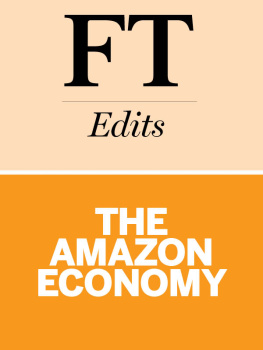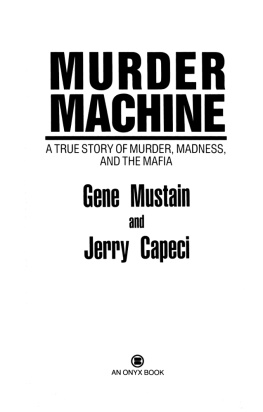Armstrong Robert - The Amazon Economy
Here you can read online Armstrong Robert - The Amazon Economy full text of the book (entire story) in english for free. Download pdf and epub, get meaning, cover and reviews about this ebook. City: United States, year: 2012, publisher: Penguin, genre: Politics. Description of the work, (preface) as well as reviews are available. Best literature library LitArk.com created for fans of good reading and offers a wide selection of genres:
Romance novel
Science fiction
Adventure
Detective
Science
History
Home and family
Prose
Art
Politics
Computer
Non-fiction
Religion
Business
Children
Humor
Choose a favorite category and find really read worthwhile books. Enjoy immersion in the world of imagination, feel the emotions of the characters or learn something new for yourself, make an fascinating discovery.
- Book:The Amazon Economy
- Author:
- Publisher:Penguin
- Genre:
- Year:2012
- City:United States
- Rating:5 / 5
- Favourites:Add to favourites
- Your mark:
- 100
- 1
- 2
- 3
- 4
- 5
The Amazon Economy: summary, description and annotation
We offer to read an annotation, description, summary or preface (depends on what the author of the book "The Amazon Economy" wrote himself). If you haven't found the necessary information about the book — write in the comments, we will try to find it.
Abstract: More information to be announced soon on this forthcoming title from Penguin USA
The Amazon Economy — read online for free the complete book (whole text) full work
Below is the text of the book, divided by pages. System saving the place of the last page read, allows you to conveniently read the book "The Amazon Economy" online for free, without having to search again every time where you left off. Put a bookmark, and you can go to the page where you finished reading at any time.
Font size:
Interval:
Bookmark:

The Amazon Economy
By Barney Jopson
with contributions from
Andrew Edgecliffe-Johnson,
Robert Armstrong and
Stuart Kirk
Foreword by Gillian Tett
First published 2012
This ebook is a collection of articles originally published in the Financial Times and on FT.com between May 2012 and October 2012, with most updated in October 2012
Copyright The Financial Times Limited, 2012
All rights reserved
The moral right of the copyright holder has been asserted.
Reasonable steps have been taken to verify the information in this ebook. However, neither The Financial Times Limited nor its affiliates can accept responsibility for any loss arising from reliance on it.
eBook design by Chris Tosic & Kevin Wilson
www.ft.com
A s Silicon Valley has boomed, there has been a flurry of public scrutiny of Apple, Google, Microsoft and Facebook. But one company has stayed strangely out of the spotlight: Amazon. For though it is one of the most successful technological giants today, with a level of market penetration that touches millions of consumers across the world, the Seattle-based group has never attracted the same level of attention.
That is partly because its founder, Jeff Bezos, is something of an enigma: he eschews the limelight and runs the publicly-quoted company with iron control. But the other reason for the relative silence lies with what Amazon does: unlike Google or Apple, Bezos group does not make cool products, or loudly aspire to change the way we think or establish friends; instead it has focused its formidable innovation talents and PhD-brainpower on less glamorous, run-of-the-mill tasks such as creating a super-efficient logistical system to deliver goods around the world, manage inventories or fine-tune prices, on a mind-bogglingly large scale.
But in spite of that seemingly dull existence or precisely because of it the company deserves far more scrutiny in todays world. That is why I encouraged Financial Times writers in the US to provide that scrutiny, with a series that illuminates the companys modus operandi as well as its extraordinarily powerful role within the wider corporate and political ecosystem. Unlike some of our competitors, the FT did not approach this task with any pre-set political views or biases: we analysed Amazon like any other listed company, looking at its corporate track record. Hence this collection includes some path-breaking analysis conducted by our Lex team, which aimed to crunch the companys numbers in a manner never done in the media before.
Nobody can ignore the regulatory and competition questions generated by Amazons rapid rise; nor its extraordinary power in a world where corporate interests can jump across national borders with far more agility than politicians or tax collectors. Thus this FT ebook is of interest not just to techies or innovation devotees; it raises themes that no politician or consumer can afford to ignore as the company creeps into our lives as deeply as Apple or Google and in a manner that may yet outlive those better-known rivals too.
Gillian Tett
Assistant Editor and Columnist
Financial Times
Gillian was the FT's managing-editor in the US before going on book-leave in the summer of 2012
By Barney Jopson
C rammed between towering wooden shelves and bulging rolls of plastic, the super-suckers and bendy hoses stacked on a pallet in a Virginia warehouse are the latest products of a plucky American family retailer.
GoVacuum is a fast-growing ecommerce business whose annual sales have gone from under $2m seven years ago to $10m today, a fivefold expansion that surpasses the overall growth of US internet shopping. Masterminded by founder Bill Anand, who arrived from New Delhi in 1974, such growth underlines the importance of small business to the world's biggest economy and commands kudos in an ecommerce sector where Amazon seems to hog the spoils.
But the success of GoVacuum and its 27 staff has not come in spite of the online behemoth from Seattle. It has come because of Amazon.
Most consumers still view Amazon as just an online retailer. Some are surprised to find it sells more than the books with which Jeff Bezos, its founder and chief executive, started in 1994. But the store front is just the tip of an iceberg.
Behind the scenes, Bezos is turning Amazon into a back office infrastructure provider that sells access to a digital market place with millions of customers, to petabytes of server space and to state-of-the-art warehouse facilities serving myriad forms of commerce, including GoVacuum's.
They are investing in areas that touch so many peoples lives theyre becoming about as important as utilities, says Sachin Anand, GoVacuums business development manager and Bills son.
Amazon has long thrived by overturning the way people shop, but its shift into infrastructure is extending its power as a disruptive force to how business is structured. It is revolutionising the way entrepreneurs can create start ups, or revive staid companies, by letting them plug their ideas into pay-as-you-go systems that cost a fraction of the investment they would need to build such infrastructure alone. They allowed us to achieve a scale that on our own we wouldn't have been able to, says Sachin Anand.
This has lifted Amazons economic influence beyond its tech peers Apple, Google and Facebook and taken it into the realm of network businesses such as stock exchanges, power grid operators, credit card processors and shipping lines.
But its emergence as a new and largely unregulated steward of such vital commercial plumbing creates tensions and dangers for clients and parts of the US economy.
Individual companies must weigh the benefits of joining Amazon's ecosystem against the costs of losing autonomy and the dual role Amazon plays as both a rival retailer and a service provider that is able to see their sales and inventory critical details for any business.
At a macro level, hub businesses such as Amazon improve efficiency, which is good news for small players, says Marco Iansiti, a professor at Harvard Business School. The bad news is your destiny is shared with a bunch of other people, he says. If Amazon has a catastrophe, if the website goes down, then a lot of people are affected. It is a source of systemic risk that we didnt have before.
Amazon is notoriously opaque and its shift into services is making a growing proportion of its business less conspicuous to the public eye, just as it becomes more critical than ever to the US consumer economy.
Unbundling the Corporation
In a letter to shareholders in April 2012, Bezos wrote: We are creating powerful self-service platforms that allow thousands of people to boldly experiment and accomplish things that would otherwise be impossible or impractical.
Its services have already produced hybrid businesses where Amazon runs marketing, customer relationships, payments, computing, logistics and distribution, leaving executives to do nothing but find or make good products, both physical and digital.
In effect Amazon is unbundling the corporation a concept coined by McKinsey management consultants in the late 1990s by letting companies shed supposedly core processes that conventional wisdom says should be combined within a single entity. Doing so, however, ties their cost bases inescapably to Amazon.
A key attraction for Amazon, which made a meagre $631m net profit on revenue of $48bn in 2011, is that it is more profitable to earn service fees than to buy and sell products itself.
Beyond pure retail, one per cent of all consumer internet traffic touches Amazon-managed infrastructure, according to DeepField Networks, a computing group. Amazon's Kindle Direct Publishing platform has enabled writers to produce ebooks.
Font size:
Interval:
Bookmark:
Similar books «The Amazon Economy»
Look at similar books to The Amazon Economy. We have selected literature similar in name and meaning in the hope of providing readers with more options to find new, interesting, not yet read works.
Discussion, reviews of the book The Amazon Economy and just readers' own opinions. Leave your comments, write what you think about the work, its meaning or the main characters. Specify what exactly you liked and what you didn't like, and why you think so.




![Harry Turtledove - Worlds that werent : [novellas of alternate history]](/uploads/posts/book/79050/thumbs/harry-turtledove-worlds-that-weren-t-novellas.jpg)

